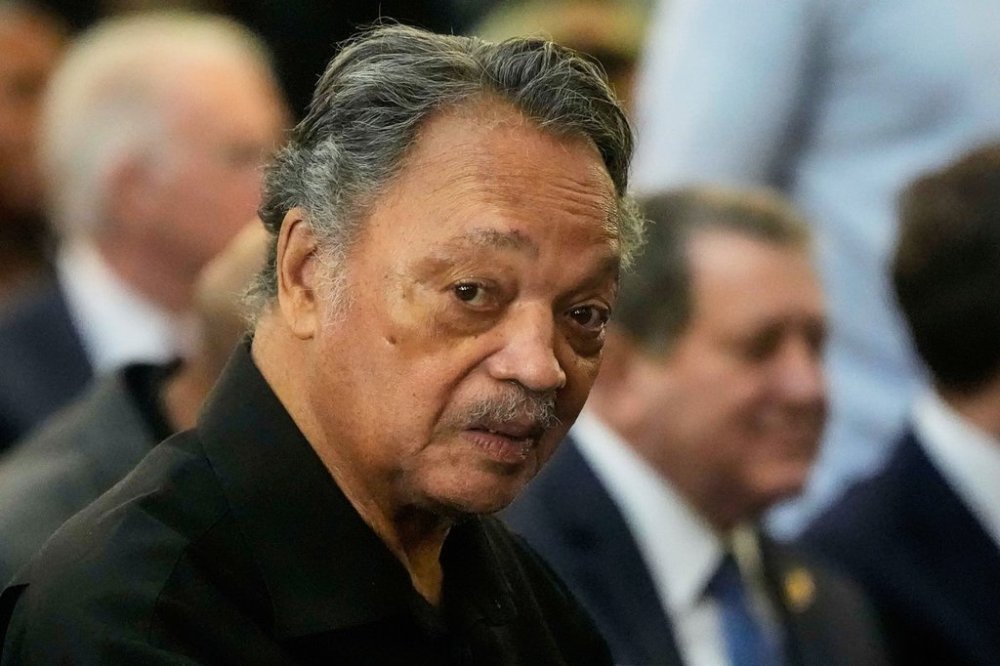Civil rights leader Jesse Jackson leaves hospital after treatment for neurological disorder
Advertisement
Read this article for free:
or
Already have an account? Log in here »
To continue reading, please subscribe:
Monthly Digital Subscription
$0 for the first 4 weeks*
- Enjoy unlimited reading on winnipegfreepress.com
- Read the E-Edition, our digital replica newspaper
- Access News Break, our award-winning app
- Play interactive puzzles
*No charge for 4 weeks then price increases to the regular rate of $19.00 plus GST every four weeks. Offer available to new and qualified returning subscribers only. Cancel any time.
Monthly Digital Subscription
$4.75/week*
- Enjoy unlimited reading on winnipegfreepress.com
- Read the E-Edition, our digital replica newspaper
- Access News Break, our award-winning app
- Play interactive puzzles
*Billed as $19 plus GST every four weeks. Cancel any time.
To continue reading, please subscribe:
Add Free Press access to your Brandon Sun subscription for only an additional
$1 for the first 4 weeks*
*Your next subscription payment will increase by $1.00 and you will be charged $16.99 plus GST for four weeks. After four weeks, your payment will increase to $23.99 plus GST every four weeks.
Read unlimited articles for free today:
or
Already have an account? Log in here »
CHICAGO (AP) — The Rev. Jesse Jackson has been released from a Chicago hospital where he was treated for a rare neurological disorder, his son said Tuesday.
The 84-year-old civil rights leader was discharged Monday from Northwestern Memorial Hospital, his son and family spokesperson Yusef Jackson said.
In 2013, Jackson, who now receives round-the-clock care at home, was diagnosed with Parkinson’s disease. The diagnosis was changed last April to progressive supranuclear palsy, or PSP, a neurodegenerative disorder which can have similar symptoms to Parkinson’s.

Yusef Jackson thanked “the countless friends and supporters who have reached out, visited and prayed for our father,” as well as the medical and security staff at Northwestern Memorial Hospital.
“We humbly ask for your continued prayers throughout this precious time,” Yusef Jackson said.
A protégé of the Rev. Martin Luther King, Jr., the two-time presidential candidate and internationally known founder of the Rainbow/PUSH Coalition was hospitalized Nov. 14.
Visitors included former President Bill Clinton and former Secretary of State Hillary Rodham Clinton, fellow civil rights leader the Rev. Al Sharpton and television court arbitrator Judge Greg Mathis.
After announcing his Parkinson’s diagnosis in 2017, Jackson continued to work and make public appearances, including at the 2024 Democratic National Convention in Chicago. In 2023, he stepped down as leader of Rainbow/PUSH, which he began as Operation PUSH in 1971, but continued going to the office regularly until a few months ago.
His family says that Jackson uses a wheelchair, struggles to keep his eyes open and is unable to speak. Relatives, including his sons, Illinois U.S. Rep. Jonathan Jackson and Jesse Jackson Jr., a former Illinois congressman seeking reelection, have been caring for him in shifts.
The Free Press acknowledges the financial support it receives from members of the city’s faith community, which makes our coverage of religion possible.


